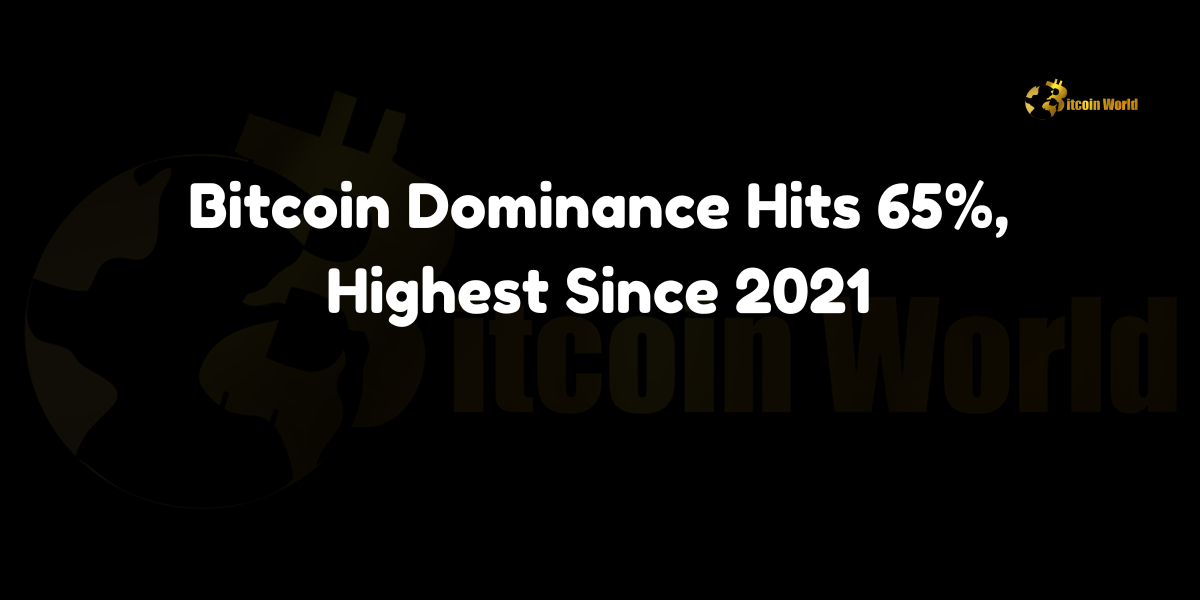Bitcoin Dominance Hits 65%, Highest Since 2021
In a remarkable development within the cryptocurrency market, Bitcoin’s dominance has surged to 65%, marking its highest level since early 2021. According to data from IntoTheBlock on X, this significant increase underscores Bitcoin’s enduring influence and strength within the overall crypto ecosystem.
What is Bitcoin Dominance?
Bitcoin dominance refers to the percentage of the total cryptocurrency market capitalization that is attributed to Bitcoin. It serves as a key indicator of Bitcoin’s relative strength compared to other cryptocurrencies (altcoins) in the market.
Importance of Bitcoin Dominance
Market Sentiment Indicator: High dominance often signals strong investor confidence in Bitcoin over other cryptocurrencies.
Investment Trends: It influences investment strategies, with higher dominance suggesting a preference for Bitcoin over altcoins.
Economic Implications: Changes in dominance can reflect broader market dynamics, such as shifts between risk-on and risk-off investments.
Factors Driving Bitcoin’s Increased Dominance
Several key factors have contributed to Bitcoin’s market dominance reaching 65%:
1. Institutional Adoption
Growing interest and investment from institutional investors, including hedge funds, pension funds, and publicly traded companies, have bolstered Bitcoin’s market position. Institutional capital inflows often favor Bitcoin due to its perceived stability and established market presence.
2. Regulatory Clarity
Improved regulatory frameworks in major markets have provided greater certainty for Bitcoin investors, encouraging more substantial investments. Clear regulations reduce the risk of market manipulation and enhance investor confidence.
3. Technological Developments
Ongoing advancements in Bitcoin’s infrastructure, such as the Lightning Network and Taproot upgrade, have enhanced its scalability and privacy features, making it more attractive to users and investors alike.
4. Macro-Economic Factors
Economic uncertainty, inflation concerns, and geopolitical tensions have driven investors towards Bitcoin as a hedge against traditional financial systems and fiat currencies.
Implications of Rising Bitcoin Dominance
The increase in Bitcoin’s dominance to 65% has several implications for the broader cryptocurrency market and investors:
Impact on Altcoins
Higher Bitcoin dominance often correlates with a decline in altcoin performance. As investors allocate more funds to Bitcoin, alternative cryptocurrencies may experience reduced liquidity and trading volumes.
Market Stability
Bitcoin’s dominance can contribute to overall market stability. As the largest and most established cryptocurrency, Bitcoin often acts as a bellwether for the entire crypto market, influencing trends and price movements.
Future Investment Strategies
Investors may adjust their portfolios to reflect the shifting dominance, potentially increasing their allocation to Bitcoin while diversifying less into altcoins. This could lead to a more Bitcoin-centric market in the short to medium term.
Historical Context
Bitcoin’s dominance has fluctuated significantly since its inception:
2021 Peak: Bitcoin reached a dominance of over 70% in early 2021 during a bull run.
Subsequent Declines: As the market matured and alternative projects gained traction, dominance waned to around 60% by 2023.
Recent Surge: The current rise to 65% signifies a renewed confidence in Bitcoin amidst evolving market conditions.
Expert Opinions
Dr. Laura Chen, Blockchain Analyst
“Bitcoin’s resurgence in market dominance reflects its enduring position as the foundational cryptocurrency. Institutional backing and macroeconomic uncertainties have reinforced Bitcoin’s role as a digital gold.”
Michael Thompson, Financial Strategist
“The increased dominance is a positive sign for Bitcoin, indicating that it remains the preferred choice for large-scale investments. However, investors should remain cautious as market dynamics can shift rapidly.”
Technical Analysis and Market Sentiment
As of October 18, 2024, Bitcoin is testing the $68,000 mark, with analysts and investors closely monitoring its trajectory towards a potential breakout at $70,200. This price movement is indicative of growing investor confidence and market momentum, factors that Pompliano anticipates will be further bolstered by institutional investment.
Support and Resistance Levels
Support Level: $65,000
Resistance Level: $70,200
Market Sentiment
The current market sentiment is bullish, driven by positive news around institutional adoption and macroeconomic factors favoring Bitcoin. However, potential regulatory developments and market volatility remain key considerations for investors.
Implications for the Broader Crypto Ecosystem
Increased Liquidity and Market Stability
Enhanced institutional investment can lead to greater liquidity, making it easier for large transactions without causing significant price volatility. This influx could also contribute to more stable market conditions, attracting even more investors.
Enhanced Legitimacy and Adoption
Wall Street’s increased interest in Bitcoin bolsters its legitimacy, encouraging broader adoption among both institutional and retail investors. This can lead to the development of more sophisticated financial products, such as Bitcoin-based ETFs and derivatives, expanding Bitcoin’s utility and accessibility.
Potential Regulatory Impact
With greater institutional involvement, Bitcoin may face increased regulatory scrutiny. However, this could also lead to more defined regulatory frameworks, providing clarity and protection for investors, fostering a more secure and transparent market environment.
Future Outlook
Looking ahead, Bitcoin’s dominance is expected to influence the trajectory of the cryptocurrency market significantly. Key trends to watch include:
Potential Milestones
Introduction of Bitcoin ETFs: Approval and launch of Bitcoin Exchange-Traded Funds (ETFs) could provide institutional investors with regulated and accessible investment vehicles.
Institutional Partnerships: Collaborations between Wall Street firms and cryptocurrency exchanges or custodians could streamline the investment process and enhance security.
Innovation in Financial Products: Development of Bitcoin-based financial instruments, such as futures, options, and lending products, could expand Bitcoin’s utility and appeal to a broader range of investors.
Long-Term Impact on the Financial Ecosystem
The strategic acquisition of Bitcoin by Wall Street institutions could revolutionize the financial ecosystem, bridging the gap between traditional finance and decentralized digital assets. This convergence has the potential to drive innovation, enhance financial inclusivity, and establish Bitcoin as a cornerstone of modern investment portfolios.
Conclusion
Bitcoin’s market dominance hitting 65% for the first time since early 2021 underscores its continued influence and resilience within the cryptocurrency ecosystem. As Bitcoin solidifies its position, the broader market dynamics will likely be shaped by the interplay between Bitcoin’s strength and the evolving landscape of alternative digital assets. Investors and market participants should closely monitor these trends to navigate the shifting sands of the crypto market effectively.
To stay informed about the latest developments in the cryptocurrency market, explore our article on latest news, where we cover significant events and their impact on digital assets.





